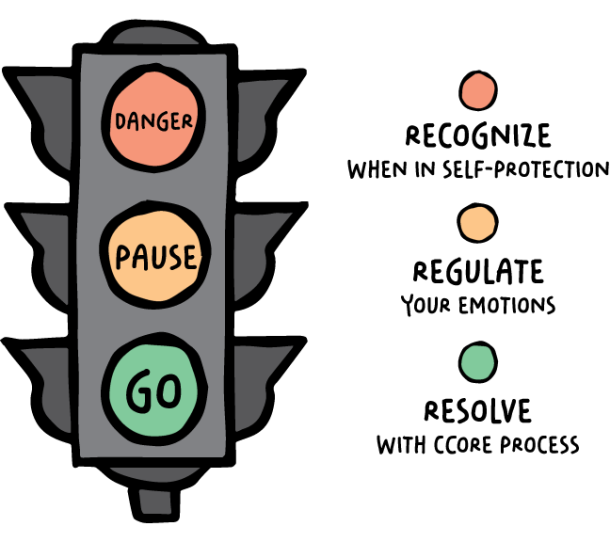“Protect Your Confidence” is a phrase that is a familiar one to most entrepreneurs. It comes as no surprise that to succeed in business entrepreneurs must show up in a good, confident place. They must be ready to engage with intentional choices and behaviors like: critical thinking and the ability to assess risks, weigh options, make hard decisions, plan ahead, all while imagining future goals and deciding when to talk and what to say to the team—these intentional actions can be relied upon in a confident business leader. Without protecting confidence and without modeling such actions and abilities, an entrepreneur will go nowhere, nor will their team.
You’re thinking, of course, it’s a given, it’s obvious, but what entrepreneurs don’t often think about is that besides protecting their confidence, they need to also protect the confidence of their team. I think this really does take most leaders 10 years at least to fully understand and so I'm going to explain it, the quick version.

Protect Team Confidence
As an entrepreneur or senior leader, or for anybody who's going to rely on a team to produce results, leaders need to learn to protect their team's confidence. And the number one way to do that is to not give in to reactive emotions—business leaders cannot allow their emotional pain to spill onto their team. That means, if you as a leader are feeling resentful, frustrated or fearful, and if you have a lot of anxiety going on about what's happening in your business (which today is so common since we are in a time where business is super hard for almost every business), it is essential to learn how to regulate your emotions and empower your confidence, which leads to growth in self-leadership.
For example: If a CEO/entrepreneur/senior leader enters a meeting feeling fearful and frustrated that things aren't going better, thinking “Hey, if the team really understands how painful this is for me then maybe they'll work harder, so I’m just going to let it all out. It’s okay. Maybe they'll get extra motivated if they know that it's so hard for me. And I want the team to see that the results aren't what they're supposed to be. I want them to know what keeps me frustrated and awake at night.”
Self-Confidence
Stop right here! As an entrepreneur, know that the importance of “protecting your confidence,” has even a farther reaching value. It’s vital to understand the deflating impact you have on the team when you don’t (or simply can’t) show up in a good confident place. Times when regulating your emotions evades you, and motivation, critical thinking and clarity are nowhere to be seen is not the time to let it all spill out on your team. (Check out: Emotions are Contagious, Good Ones Too.)
APPRECIATE THE IMPORTANCE OF PROTECTING THE CONFIDENCE OF THE TEAM
Self-Protection
An entrepreneur doesn’t typically think about the importance of “protecting the confidence” of their team by showing up at a meeting confident themself! Instead, when a leader is in a self-protective and emotionally reactive space due to challenging or frustrating stuff going on, thinking and actions may go more like this:
A leader (thinking the team needs to feel the pain he/she is feeling) feels justified and chooses to be snippy, judgemental, or make sarcastic comments to get the team's attention. This definitely shakes the team up, but not in the way a leader might assume. Nope, it completely backfires, leaving the team feeling stressed, threatened and insecure! Instead of motivating the team to do better, the highest performers on the team who are there ready to work and put forth concentrated effort, instead, become resentful of the leader who is not sharing ownership of the poor results, nor seeking the team’s input or perspective on solutions.
Team Reaction
As the CEO/leader spills reactive emotions that are critical, judgemental, intense or anxious, the team’s confidence spirals downward; their faith in themselves and their feelings about their ability to make a difference plummet right along with their loss of confidence. Thoughts quickly go from feeling like a confident contributor to self-protection and self-doubt.
As the team sits there, listening to the CEO/leader’s spiel of overwhelm and stress, super anxious thoughts begin to silently spew within each member of the team. Team confidence is stripped away with each sarcastic remark and verbal disappointment from their CEO.
The team’s reactive thoughts start swirling within as the leader’s emotional spiel goes on:
- “Oh my gosh… Not only are the results going badly, but this is really my fault. I messed up. I’m responsible for the pain my CEO is feeling.” (Communication stops. There is silence in the room. There is discomfort in giving feedback.)
- “My performance wasn't good enough. This outcome is horrible. What will I do now to fix this?” (Feeling too responsible and striving to over-perform.)
- “I don't think I'm a good fit anymore. Maybe someone else could do this job better than me.” (Self-doubt takes over; the team member is left feeling powerless, criticized and confused.)
- “What could I have done differently? I have no clue.” (Embarrassment turns to anger.)
- “What about my thoughts? I feel so disrespected!” (Self-protection and feelings of victimization take over.)
Teams have an extremely hard time seeing their leader's words for what they really are; they are not valid. Highly emotional, they have little merit. They eliminate critical thinking and freeze the team’s ability to move forward to next steps. Above all, as human beings, the team takes their leader's words to heart and they spiral into emotional reactivity in return. A spiel by a leader about stressed, anxious feelings is never a behavior that can generate positive results.
Regulate Emotions
So… protect YOUR confidence—model it by regulating your emotions! This maintains and protects your team’s confidence. I know what some of you are thinking… how?
I want you to take a moment right now and picture your best performers. Are there really other people out there who can do better than them? I'm one hundred percent certain that you would be devastated if you lost your best performers because you haven’t learned how to achieve being the confident and empowering leader you desire to be for yourself and your team.
So here’s a few suggestions on how to achieve being the confident and empowering leader you desire to be for yourself and your team:
(Adopt this; put it into action and you gain confidence to become a more effective leader.)
- First, raise your awareness! Recognize when you are emotional and when you're emotionally reactive. Know what is likely to trigger you.
- When you're triggered, acknowledge it to yourself, “I'm in a place where I'm pretty anxious. I can already feel that I am perceiving my team as not as capable.” Become aware of your anxiety in whatever form it takes.
- Recognize triggers; choose to pause (your mind); choose to wait until you can get out of this anxious space before you talk to your team.
A FEW WAYS TO REGULATE YOUR EMOTIONS
Before you talk to the team:
- Take steady, deep breaths. Close your eyes, relax.
- Count to 10, slowly. Tell yourself, “I’m okay.”
- Walk around the block trying to focus on the outdoors.
- Do some stretching or jumping jacks.
- Take a music/dance break.
- Take your dog out for some play.
- Engage in exercise or recreation you enjoy.
- Call a friend, call a colleague, call your therapist; talk to somebody who's not involved. Call somebody who is not in this race with you, somebody who has a clear perspective because they are not in business with you.
- Many entrepreneurs have masterminds; they use them to help get their emotions regulated.
- Make a conscious choice about the impact you want to make.
- Always remember, if words do need to be spoken before you feel you have regulated your emotions, and haven’t had a chance to pause, say something like this; “Let me think about this; I’ll get back to you in a moment” (or “a little later today.”)
- From there, stay focused on your intended outcomes.
Focus on Outcomes
Lastly, remember that you want your team to be focused on the intended outcomes of the business —and not on you! Worrying about your reaction consumes their time and productivity; your reactivity distracts them from tasks/ projects that need doing to get the results you desire.
Our goal for you is that you grow in self-leadership. Communicate clearly to your team about what you do want to be the focus of your business: define company goals, establish clear roles, build trust in team relationships—appreciate your leadership growth as you do so.
Now get on with enjoying your team as you set goals and achieve outcomes—together!
If you want more, pick up a copy of my book, The People Part on Amazon or available at your favorite book retailer, or at LeadingEdgeTeams.com.
Warmly,
Annie










